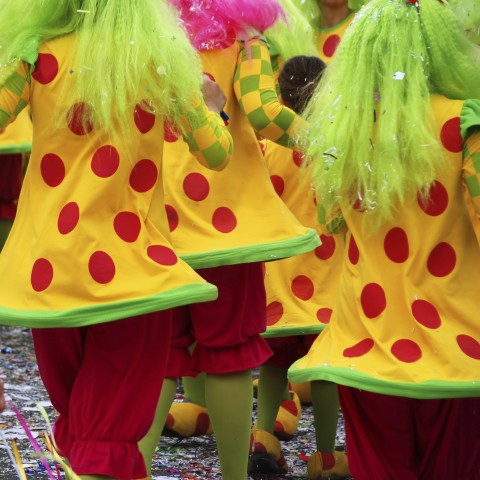Apokries, the term for Carnival season in Greece, is a major celebration throughout the country, and one of the most colorful. With roots in both paganism and Christianity, traditions can look quite different from one region to the next!
In this article, you’ll learn all about the Greek Carnival, from its origins to modern-day celebrations around Greece. Are you ready? Let’s get started!
1. What is Carnival?
Carnival in Greece is a period of merrymaking, entertainment, and masquerade. The atmosphere is cheerful, with many costume parties, lots of teasing, and carnivals that take place in various regions of Greece. The period of Carnival in Greek culture is also the official opening of the Triodion period, a period which is intended to prepare us for the welcoming of Easter and the Resurrection of Jesus Christ with fasting, prayer, and repentance.
The three weeks of Carnival are called Profoní (Announcement Week), Κreatiní (Meat Week), and Tyriní (Cheese Week), which is also called Tyrofágou (Cheese-eating Week). The Κreatiní week ends with Apókreo Sunday (No-meat Sunday) because from the following day, we abstain from eating meat. During the week of Tyrofágou, we eat dairy products as an intermediate step between eating meat and the fasting that will follow in the next period, the Lent.
Carnival, however, is also associated with ancient pagan events, especially with the worshipping of the god Dionysus, who would be reborn to bring spring.
-
→ Since you’re here, why not study up on vocabulary for Fat Thursday and Clean Monday?
2. When is the Greek Carnival Season?
Greek Carnival (Apokries) lasts for three weeks and is celebrated seventy days before Easter, during February or March. For your convenience, here’s a list of this holiday’s start and end dates for the next ten years.
| Start Date | End Date | |
|---|---|---|
| 2020 | February 9 | March 1 |
| 2021 | February 21 | March 14 |
| 2022 | February 13 | March 6 |
| 2023 | February 5 | February 26 |
| 2024 | February 25 | March 17 |
| 2025 | February 9 | March 2 |
| 2026 | February 1 | February 22 |
| 2027 | February 21 | March 14 |
| 2028 | February 6 | February 27 |
| 2029 | January 28 | February 18 |
3. Carnival Traditions in Greece
For Carnival in Greece, traditions of the province show those deeper pagan roots with animal-like disguises—mainly reminiscent of billy goats—and large bells that expel the evil with deafening noises. One well-known custom is that of the Γενίτσαροι και Μπούλες (Yenítsari ke Búles), or “Janissaries and Boules,” of Naousa, who wander around the streets dancing with specific steps and wearing peculiar masks called prósopi (“faces”). In these Greek Carnival costumes, the Boules are men dressed as women, while the Janissaries wear fustanella skirts.
Carnivals are organized in large cities, the most famous one being that of Patras. Other well-known carnivals are those of Xanthi and of Moschato, in Athens. The Patras Carnival includes events such as dances, parades, a treasure hunt, a children’s carnival, and more. It culminates on the last weekend of Carnival with the evening parade of floats and their crews, and with the ritual burning of the Βασιλιάς καρνάβαλος (vasiliás karnávalos), or “Carnival King,” on St. Nicholas Pier in the harbor. The costumes of the participants and the floats are highly imaginative and occasionally Σατιρικός (satirikós), or “satirical.”
Generally, during Carnival, people roam the streets in costumes throwing streamers, confetti, and teasing each other. In the area of Plaka in Athens, however, if you see youngsters with plastic clubs, beware! They will club you hard!
4. What’s in a Name?
Do you know what the word “carnival” exactly means and where it comes from?
The word “carnival” comes from the Latin “carne levare,” which, like the Greek word apo-kriá, refers to abstinence from meat. Some experts, however, believe that it came from the also Latin “carrus navalis,” which means “nautical carriage.” The former view supports the Christian origin of the term while the latter a more pagan origin.
-
→ To learn some useful religion-related Greek vocabulary, check out our Religion vocabulary list!
5. Must-Know Vocab for Carnival in Greece
Ready to review some of the vocabulary words from this lesson? Here’s a list of the most important Greek vocabulary for Carnival season!
- Κομφετί (komfetí) — “confetti”
- Κουστούμι (kustúmi) — “costume”
- Απόκριες (apókries) — “carnival”
- Μασκάρεμα (maskárema) — “masquerade”
- Πάρτι μασκέ (párti maské) — “costume party”
- Μεταμφίεση (metamfíesi) — “disguise”
- Βασιλιάς καρνάβαλος (vasiliás karnávalos) — “Carnival King”
- Σερπαντίνα (serpandína) — “streamer”
- Ρόπαλο (rópalo) — “club”
- Καρναβάλι (karnaváli) — “Carnival”
- Νηστεία (nistía) — “fast”
- Χαρτοπόλεμος (hartopólemos) — “confetti”
- Αποκριάτικος (apokriátikos) — “of or related to Carnival”
- Κυριακή του Τελώνου και Φαρισαίου (Kiriakí tu Telónu ke Fariséu) — “Sunday of the Publican and Pharisee”
- Κυριακή του Ασώτου (Kiriakí tu Asótu) — “Sunday of the Prodigal Son”
- Κυριακή της Απόκρεω (Kiriakí tis Apókreo) — “Meatfare Sunday”
- Κυριακή της Τυροφάγου (Kiriakí tis Tirofágu) — “Cheesefare Sunday”
- Γενίτσαροι και Μπούλες (Yenítsari ke Búles) — “Janissaries and Boules”
- Κουδούνι ζώου (kudúni zóu) — “animal bell”
- Ο Γέρος και η Κορέλα (O Yéros ke i Koréla) — “Yeros and Korela”
- Μάσκα (máska) — “mask”
- Μακιγιάζ (makiyáz) — “makeup”
- Σατιρικός (satirikós) — “satirical”
- Γαλακτοκομικό προϊόν (galaktokomikó proión) — “dairy product”
To hear the pronunciation of each word, and to read them alongside relevant images, be sure to visit our Greek Carnival vocabulary list!
Final Thoughts
We hope you enjoyed learning about the Carnival season in Greece with us. What are your thoughts on this holiday? Do you celebrate Carnival in your country? We look forward to hearing from you!
If you’re interested in learning more about Greek culture and holidays, you can visit the following pages on GreekPod101.com:
- Pop and Traditional Culture in Greece
- Top 5 Things You Need to Know About Greek Society
- Greek Etiquette, Manners, and Customs
- What’s Your Favorite Greek Food?
- Dormition of the Mother of God Traditions in Greece
Whatever your reasons for developing an interest in Greek culture or the language, know that GreekPod101.com is the best way to expand your knowledge and improve your skills. With tons of fun and effective lessons for learners at every level, there’s something for everyone!
Create your free lifetime account today, and start learning Greek like never before!













